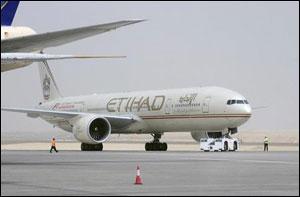The much-anticipated Etihad-Jet Airways deal is being billed as a "game changer'', as it will bring in benefits such as wider network, better distribution, improved revenue and cost-saving synergies for both airlines.
 Jet Airways (India) Ltd is the largest carrier in terms of deployed capacity and the second largest in terms of market share in the domestic market. On the international routes, it is placed second behind Air India, based on capacity.
Jet Airways (India) Ltd is the largest carrier in terms of deployed capacity and the second largest in terms of market share in the domestic market. On the international routes, it is placed second behind Air India, based on capacity.
According to a Centre for Asia Pacific Aviation (Capa) report, Etihad Airways is the third largest Gulf-based carrier (after Emirates and Qatar Airways) based on deployed capacity over its entire network. It flew 10.29 million passengers last year and has a fleet of 64 wide-body planes. Like its bigger regional peers, Etihad's ambitions, too, are grand.
"Our goal is to be a profitable, sustainable business, growing in line with Abu Dhabi. By 2020, we plan to be a major global player, with potentially 25 million passengers per year, 27,000 employees and up to 100 destinations,'' Etihad's chief executive officer James Hogan said in an interview with an International Air Transport Association publication last October.
The proposed sale of a 24 per cent stake to Etihad for about Rs 1,600 crore (Rs 16 billion) will bring in the much needed capital infusion and help Jet cut down its debt burden. Moreover, it will help Jet widen its network through code share alliances and could also give a boost to its cargo business. Twenty per cent of Etihad’s revenue comes from cargo and it has six freighters. The deal will enable the Abu Dhabi-based airline widen its footprint in India.
Apart from the benefits on the commercial side, the deal is likely to give the two airlines a cost advantage. Jet sources confirmed the deal would lead to synergies and cost savings for both carriers, but refused to share further details. Jet is also likely to shift its international hub from Brussels to Abu Dhabi in due course.
One such instance of mutual benefit can be seen in Etihad and Air Berlin's decision to integrate their Boeing 787 fleet. Together, the two airlines have 56 of those planes on order. According to a Capa report: "A combined Etihad-Air Berlin team, led by Etihad, will oversee the integration programme, which will see the two airlines share infrastructure and pool maintenance, develop joint training programmes and streamline purchasing activities, as well as work jointly on product development for the new aircraft type." Jet Airways has 10 Boeing 787s on order.
Another example is of partner airlines integrating their sales and distribution efforts, creating joint offices, general sales agents and single marketing teams at certain offline stations. British Airways, which held a 25 per cent stake in Qantas during 1993-2004, set up common sales offices in Southeast Asia and Sri Lanka. In a recent example, International Airlines Group, which controls British Airways-Iberia after their merger, is aiming at synergies valuing £450 million ($706 million or Rs 3,760 crore today) by 2015 through procurement savings and use of information technology.
"Etihad is poised on Monday to reveal a second year of profits. Added to that, Etihad's diverse stakes in other airlines like Air Berlin and codeshares with over a dozen airlines means that Jet can leverage this partnership and grow its business inorganically and much faster than if they were to go it alone,'' said Saj Ahmad, a London-based aviation analyst.
"For Etihad, they would get access to a lucrative domestic Indian market that has freed up capacity in the wake of Kingfisher (Airlines) collapse. It never made any sense for Etihad to invest a penny in a grounded airline and one which now has no operating licence. Jet has no such restrictions and through them, Etihad will be able to carve out a strong niche in the Indian market,'' he added.
Capa agrees. In its analysis on the Jet-Etihad deal, the aviation consultancy firm said: "Jet will get a much needed boost while Etihad gains strategic entry into a long term growth market. The practical implications of the deal will unfold over the coming weeks, but the outcome is likely to be changes in Jet senior management level, much deeper code sharing and schedule co-ordination between two carriers and probably joint purchasing agreements.''











